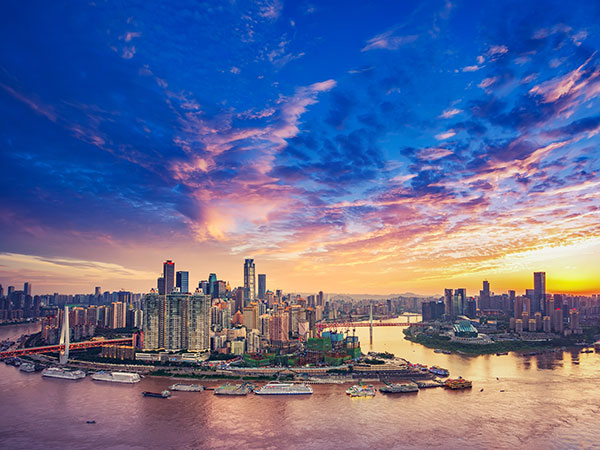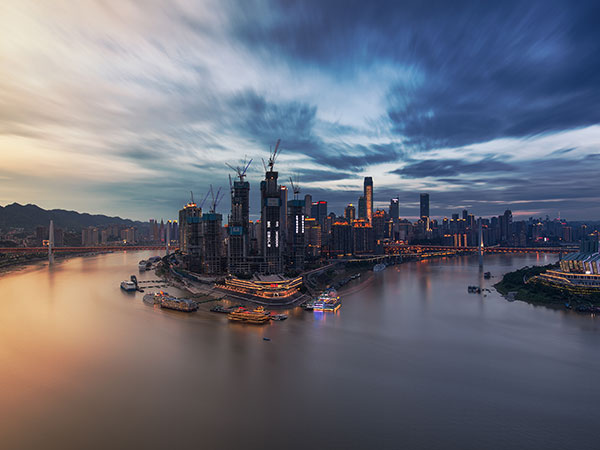Chaotianmen Square is a newly-built architecture which situates at the confluence of the Yangtze and Jialing Rivers in the Peninsula of Yuzhong District in
Chongqing. This square has gradually become a prosperous zone which shows the rapid development of this historic city. Standing on the Chaotianmen Square, visitors can get an ideal view to the glorious
Yangtze River. The Chaotianmen Square was built in the summer of 1998, covering an area of 800,000 square meters, and the ship-shaped square is one of the largest roof squares in China. This gorgeous river which mixes the past and the present culture of Chongqing City just flow in front of your eyes. During the festival period, there is a large-size ship model which is consisted of thousands of flowers in the center of this Chaotianmen Square for visitors to take photos. It is composed by four major parts namely the View Scenery Square, the protection shore ladder road, the traffic square and the peripheral environment. It is a symbolic construction of integrated water collection and key position land transportation function. Four towers stand at the corners of a generous public podium planted with Banyan trees. The composition of four buildings represents a four pillared gateway, as well as the four winds, the four seasons, and the four directions of the world. The towers are each 40 metres by 40 metres in plan and stand 80 metres from each other. The total developed area below podium level is 370,000 squares metres with a further 400,000 square metres above podium level.
History
It is said that Chaotianmen was built in 314 BC, when constructed Ba prefecture after country Ba was perished by Qin general Zhangyi
In the early Ming dynasty, Daiding expanded the old city of Chongqing and built 17 gates according to the number of 8 tri-grams and 9 halls diagram, one of the largest gate is the Chaotianmen. Upon the gate there was four characters originally: 古渝雄关 which means Ancient Chongqing Impregnable Pass. Because this gate stands in the same direction of Yangtze River flowing east, facing imperial city N
anjing, so the gate used to welcome the royal, so it named “Chao Tian Men (Have an Audience with Emperor Gate)”.
Chongqing became commercial port in 1891, there was established customhouse in Chaotianmen. In 1927, because of building Chaotianmen wharf, the old gate was removed. In 1949 “9 · 2″fire disaster made 2 km area around Chaotianmen wharf run into ruins, from then on, Chaotianmen only remained city walls.
Today’s Chaotianmen passenger terminal, the newly built magnificent Chaotianmen square, is a good place for overlooking the convergence of two rivers and appreciating the scenery along the river.

Highlights
On the left side of Chaotianmen, small streams collected in J
ialing River, longitudinal flow is 1119 km, and go into the Yangtze River here. Whenever the early summer or Mid-Autumn, the flow impact of green Jialing River and the Yellow Yangtze River makes whirlpool, pure and turbid, very spectacular. On the right side of the Yangtze River is Rongjialing River, passing through the Three Gorges, flowing down vigorously, become a “gold water part” of the Yangtze River.
Chongqing
Highway “zero kilometers” sign is located in Chao
tianmen Square. “Zero kilometers” is the starting point of a country or a city main road, is also a symbol of the city center. China’s “zero kilometers” sign position has been confirmed in the middle of the Tiananmen Square, and “Zero kilometers” of Shanghai is in the People’s Square.
What to see in Chaotianmen
【Chaotianmen Wharf】 Chongqing is the birthplace of the Yangtze River Three Gorges, therefore Chongqing has the Yangtze River Three Gorges tourism resource, every year Chongqing receives millions of tourists. In order to meet the huge demand of the Three Gorges tourism market, Chaotianmen several big docks is swamped with all kinds of sole proprietorship, joint venture tonner Yangtze River cruise.
【Fugui Stone】 Lady Tushan stood in rock projecting over water, awaited for her husband to come back, therefore it named “Fugui Stone (Husband Come Back Stone), also known as “Hugui Stone (Calling Back Stone)”.Chaotianmen occupied the golden waterway hub, one of the main traffic hub for Chongqing. After 1949, the terminal was undergoing extension repeatedly, expanded along the two rivers. Passenger terminal building rose from ground, and passenger and cargo cable car straight in the both sides of river.
【Ciyun Temple】 Ciyun T
emple in the south bank, formerly was Guanyin Temple, was built in the Tang dynasty, and rebuilt in the Qing emperor Qianlong period twenty-second year (AD 1757).
In order to create good karma, the temple abbot Master Yunyan broke the old routine, became the only temple that has monks and nuns at that time and to now. On the center of the great buddha’s hall in the temple, there is enshrined a big jade Buddha, which came from Myanmar, arrived in Chongqing in 1931.Buddha is 1.87 meters high, 1.34 meters wide, 1500 kg, is one of the four famous jade Buddha temples existing in our country, the other three is the Jade Buddha Temple in Shanghai, one in Beijing Beihai Round City, and one is Guiyuan Temple in Wuhan.
In the top left corner of mountaintop Ci
yun Temple is Huanshan Mansion where Chiang Kai-shek escaped the Japanese bombing during the Anti-Japanese War. And Wangjiatuo close to the south bank of marbles stone was concession as early as before the war of resistance.
【Two Rivers】 East of Chaotianmen, north of the Yangtze River, 5 li (Chinese Unit of length) from Jiangbei District Gailan Stream there is a white tower, go eastward by boat, people can see along the Yangtze River. This kind of towers, or white, or black, this is the mascot that ancient ancestors longed for living a stable life, named “Town Demon Tower”, built in the city of road, meaning a good man can go into the city, all the evil monster cannot pass. In ancient times, it was also the road sign, not only told pedestrians that the city is in the front, also showed that only five li distance. On the left of Chaotianmen is Jialing River, originated in Shaanxi Qinling Mountain Pulse and southern Gansu, flow through Shaanxi, Gansu, Sichuan province, the total length of 1119 km, and over the Jiangling River there is shuttling back and forth Jialing passenger ropeway, started in December 1980, finished in one year, total length of 740 meters. Chaotianmen cable car is one of the unique short-distance transports in mountain city Chongqing, mainly to solve the suffering of climbing mountain for guests who take boat to, was built in 1984.The first C
hongqing cable car originally built in 1945 in Wanglongmen.
【Chaotianmen Bridge】 Chongqing Chaotianmen Yangtze River Bridge is located in the downtown central business district of Chongqing, connects Jiangbei Wulidian interchange in the west, connects Chongqing Yuqian highway Huangjuewan interchange of Nanan distract in the east, which is the main arterial traffic of east-west direction from Chongqing main urban area to outward. The west of bridge through the ‘ring road’ can connect the airport, Yuhe highway (Chongqing-Hechuan), Yufu highway (Chongqing-Fuling), and Chengdu-Chongqing expressway, the bridge east can be connected to Yuqian highway (Chongqing-Zhanjiang) and Yuchang higway (Shapingba district to Changshou County).Within the road network in Chongqing urban area, Chaotianmen Bridge is the important channel connect Yuzhong, Jiangbei, and Nanan CBD, link up the both sides of the Yangtze River.
Travel Guide of Chaotianmen Squre
【Best time to travel Chaotianmen】 from June to November is the best time to travel. Every early summer and mid autumn, Jiangling River is green and Yangtze River is yellow, two rivers intersect in Chaotianmen, just like wild horse running.
【How to get to Chaotianmen】 taking tram No.401, bus No.102, 013, 122, 251, 382, 418 or 252, 413 and 420 to Chaotianmen Stop. Or you can take light rail Line No.1 to Xiaoshizi Station (4A exit) and walk for 790 meters.

